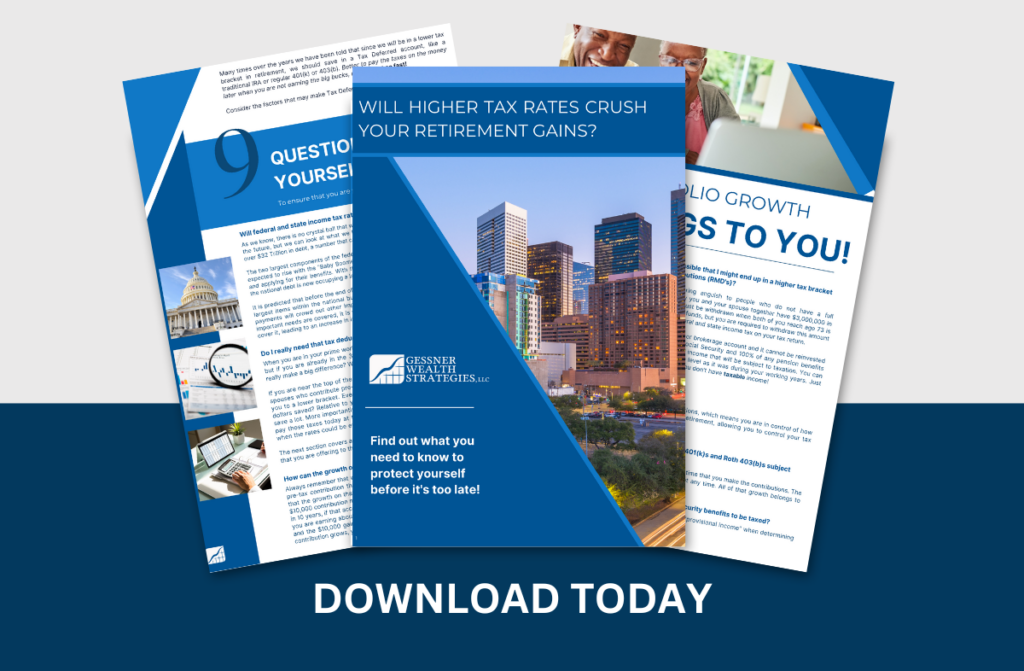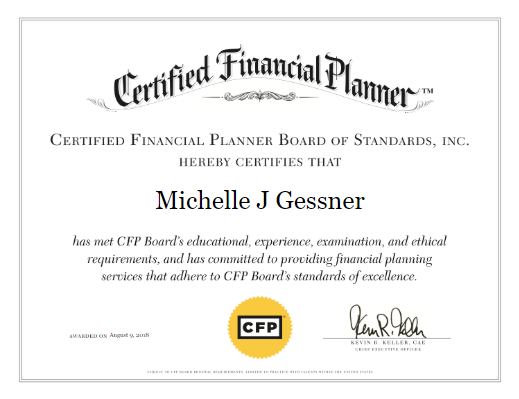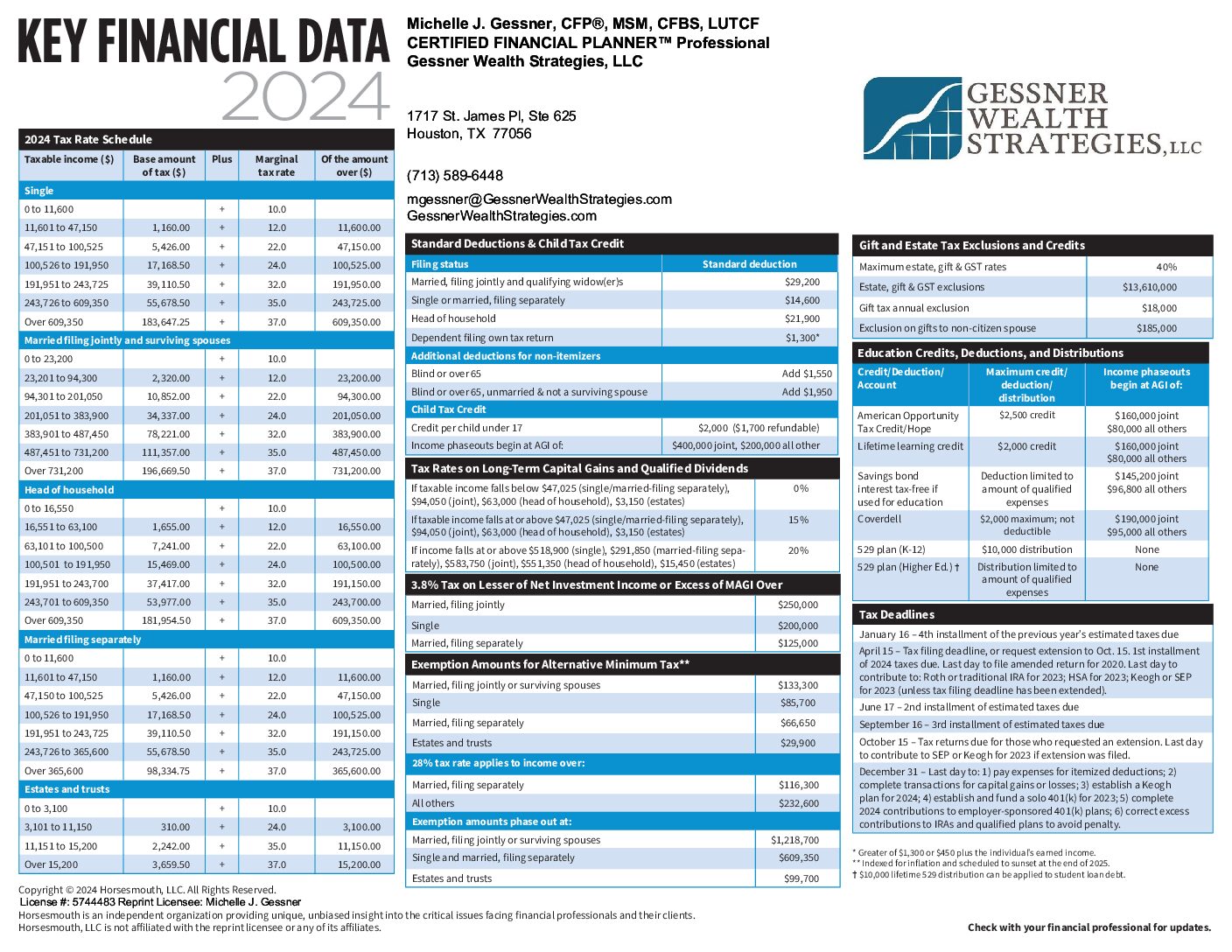The relationships we have with each of our clients are long-term and meaningful, and we see ourselves as a financial partner to help them through the chapters of their lives.
- We go above and beyond for our clients in everything that we do.
- We incorporate tax planning as part of our service to you each year so that we can help reduce your taxes in retirement.
- We stay on top of the latest tax legislation, especially as it relates to IRA’s, taking a higher level of education than is required. We are part of the Ed Slott Elite Advisors group, which means that we spend many hours per year understanding tax and estate planning changes that impact your retirement. Our membership with Ed Slott allows us access to their office for complex questions that may impact clients, many of which are not familiar to most CPA’s.
- We see ourselves as part of the team of professionals that you utilize and proactively work with your estate planning attorney or CPA so that the work being done is coordinated and connected.
- Our investment philosophy is academic and evidenced based. We take a disciplined and sophisticated approach to wealth management and never take a commission for investment trades, which removes potential conflicts of interest.
- We’re accessible and approachable, and if you reach out to us, we strive to respond within 24 hours, if not sooner.
- As a fiduciary advisor and CFP® professional, your interests come first.
No. We have clients who live out of state. We use technology like Zoom conferencing that allows us to share our screens and see each other in real time. We use email and electronic documents to make the distance a non-issue. For our clients who would like a face-to-face visit, we can make it happen by travelling to you.
Since financial planning is such a personal relationship and can be daunting, we understand the importance of having a conversation that allows us to get to know each other and have a chance to share our experiences and observations. Therefore, we do not charge for the first two meetings.
This is a very good question. We strive to develop long-term relationships with all our clients, so you can rest assured that you always have a trusted advocate standing with you throughout life’s many chapters. It's important you're able to adequately determine our compatibility from the outset, and as such we endeavor to be totally transparent with you about our approach. You would be a good fit for Gessner Wealth Strategies if:
- You’re interested in a long-term partnership with a proactive team dedicated to helping you organize your financial life and keep it that way.
- You’re looking for a partner to help you make sense of your present state of financial affairs, and to help you see what the future might look like based on what you have in place today.
- You’re willing to let go of the illusion of market timing. It’s clear that market timing is a fool’s errand, so we follow a disciplined investment process to save our clients from making incredibly costly behavioral investment mistakes that make up for our fee in years, if not decades.
- You’re willing to meet at least annually and return our phone calls so we can keep each other up to date.
- You value advice from professionals and recognize that value comes at a cost.
If you don’t have $1,000,000 yet, but need help, there are still ways that we can help. Our founder, Michelle Gessner, offers ongoing adult education classes typically held at a local Houston Community College campus that you can attend. Please check with our office for the next scheduled class. You are also welcome to subscribe to our monthly newsletters and blogs to get the latest information and articles that contain financial guidance. Another option is to visit www.letsmakeaplan.org to find a CERTIFIED FINANCIAL PLANNER™ professional who will be able to help you. Lastly, feel free to call us or email us for a referral to a local advisor.
For your convenience and safety, we use Charles Schwab as the custodian for our client assets. Your money is held securely with the custodian who provides reporting to you and the IRS. Your accounts can be viewed at any time by logging into the custodian's portal, available 24/7. Schwab offers a security guarantee against unauthorized access. Read more by visiting our blog article on this subject.
Most people think all financial planners are “certified,” but this isn’t true. Anyone can use the title, “financial planner.” Only those advisors who have fulfilled the certification and renewal requirements of the CFP® Board can display the CFP® certification trademark which represents a high level of competency, ethics and professionalism. A CFP® practitioner has special technical expertise with regard to retirement, estate, tax and investment planning; but the real skill comes in the ability to bring all those pieces together. In addition, CFP® practitioners are held to a fiduciary standard of care when providing financial planning services, and a CFP® professional is required to act in your best interest. (Source)
LUTCF stands for Life Underwriting Training Council Fellow. This is a professional designation that is given jointly by The American College and the National Association of Insurance and Financial Advisors. The LUTCF® is the industry benchmark for insurance credentials and requires not only the completion of multiple courses but the passing of exams for each of those courses.
A fiduciary places client interests first, ahead of her own, and is held to the highest standard of care, higher than the “suitability” standard of care, which is what an advisor who is not a fiduciary is required to uphold. Sounds basic but not all financial professionals work as a fiduciary. We do.
We don’t believe that stock picking, market timing, and chasing the latest track record is good for anyone except Wall Street. Instead, we ask questions about your goals and time horizon, what’s important to you, and how you feel when markets decline and the financial media is doing its best to rattle you. Then, we construct your portfolio with a high level of diversification using asset class investing, which believes in owning securities from thousands of different companies, across different industries, and across different geographies. Our typical client portfolio may hold 10,000 distinct companies. Asset class investing is defined by selecting the securities that best represent an asset class, such as small or large companies, emerging markets, or international, and tilting to certain asset classes that may provide a premium to the long term investor while eliminating certain securities that do not make sense — instead of blindly following an index. In addition, we don’t make bets on single stocks, industries, regions or the economy. It is important to note that the funds that we use are institutional share classes not available at the retail level, very low cost, and academically constructed. We also have portfolios that use ETF’s or individual stocks, tax loss harvesting, and screens for Environmental, Social, or Governance factors important to you.
We don’t use proprietary products in our portfolios or accept payments from the firms whose products we do use. We are not beholden to anyone whose interests conflict with those of our clients.
Want to read more about our Investment Philosophy? Download our white paper, “Evidence-Based Investment Insights: 12 Essential Ideas for Building Wise Wealth”.
Our fees are simple and transparent. We charge a financial planning fee and an investment management fee for these separate services.
The financial planning fee is based on the complexity of your situation and the amount of time needed to go through our comprehensive process. It covers a year of planning, coaching, implementation, and engagement. Here are some examples of our planning fee based on the complexity. For a single working person with two to four investment accounts, the fee is typically $3,600 for the first year. For a single or couple in or nearing retirement, the fee is typically $4,800. For a business owner or someone with multiple real estate holdings, the fee is typically $5,500. For an entrepreneur with multiple businesses and trusts, the fee is typically $8,500.
Thereafter, the annual update fee is reduced, typically by just under half. This fee is always provided to you upfront.
The investment management fee is a tiered Assets Under Management (AUM) fee stated as a percentage. The tiers are structured so that the overall percentage you are charged decreases as your account size increases. This fee is charged quarterly and deducted from each account at the beginning of each quarter, based on the value of the account at the end of the preceding quarter. The fee is disclosed as a line item on the monthly and quarterly statements and collected by the custodian, so you do not have to write a check, and any fees coming out of an IRA account are paid with pre-tax dollars, which is a nice allowance by the IRS. The total annual percentage starts at 1.25% for our minimum sized account, billed at .3125% per quarter, but most of our clients pay about 1% annually, billed at .25% per quarter. For accounts over $5 million the percentage is reduced.
It is important to understand that some firms will charge an investment management fee that is lower, but then they get paid on the cost of your investments by the investment companies whose securities they use for your account. We do not engage in this practice which we feel is less than transparent. We use only low cost investments, such as institutional share class mutual funds or low cost ETF’s, and our team of investment professionals operates as fiduciaries, never taking a financial incentive from the investments they manage.
This is an important question. There are so many great tools for those people who want to handle their own investing and financial planning. However, most people have a tough time implementing their plan consistently. According to DALBAR, the respected research organization that studies investor behavior and publishes a report each year since 1994 to compare investor behavior with the market, the average investor (both bond investors and equities investors) grossly and consistently underperforms the market. For example, in the 30 years through December 2018, the average bond investor earned .26%, annualized, compared to 6.1%, annualized, by the Bloomberg-Barclays Aggregate Bond Index for that same period. Stock investors underperformed the S&P 500 returns by 5.88%, annualized, over the same 30 years. And that’s just the beginning of the problem with doing it yourself.
While some people may be able to research a great fund, or do their own taxes, the key is tying together all the important pieces without missing one. Taxes, insurance, employee benefits, investments, cash flow and retirement planning, estate planning, the proper handling of Net Unrealized Assets (NUA) and so much more.
The reason our clients choose to work with us and pay for our services is because there is a lot to learn. And the cost of making a mistake is high. What if you didn’t save enough to cover for inflation before and during retirement or you didn’t estimate properly the cost of Medicare? How do you know if you’re really saving enough? Or if you’ve saved enough to retire? Should you work another year? Or more? Does your savings cover for all the spending you need to do in retirement? When is the best time to file for Social Security – not just in general but in your case? What if you pay off your mortgage at retirement with your 401(k) and you end up running out of money and you must sell your house anyway? When is the right time to sell during a market correction? Or is there a right time? Should you consider a Reverse Mortgage or is that a bad deal? When should you downsize? How do you properly handle company stock so that you get the special capital gains tax treatment allowed instead of having it taxed like the rest of your 401(k)? When will you get the next “trigger event” for that and what are the pitfalls? What about tax planning – should you convert to a Roth now or wait and if you do, how much is best for your personal situation and what are all the factors to consider? Do you have to take an RMD from your Roth 401(k) and if so, is there a way to legally avoid that? Will a Qualified Charitable Donation be helpful now that the tax laws have changed, and you won’t be itemizing? How does the SECURE Act impact you and should you use a trust for your IRA money knowing that trust tax rates are very high and the stretch provisions for IRA’s have been eliminated for almost everyone?
All of these questions might have their own separate isolated answer, but how do you weave together all of these pieces since each may have an opposing consideration that may offset the benefit of another for your personal situation? There is no one size fits all answer and it’s hard to Google your way to financial security.
The questions to ask yourself are:
- Can our professional investment management, financial planning and tax planning bring at least an additional 1% - 1.25% return to you per year over the life of your portfolio than you could do on your own?
- Can we save you the equivalent of 1% - 1.25% a year in time, effort, worry, and record keeping?
- Can we save you more than our fee each year in the cost of the mistakes we help you avoid?
Our clients choose us because they don’t want to get it wrong. They want a partner they can trust. Professional investment management and financial planning often prevent dozens of potential mistakes – any one of which pays for that fee for years, if not decades.
One way to look at it is to ask yourself if you think it’s possible that you’ll have more money or a bigger nest egg or net worth by having a financial professional involved even after paying the advisory fee. In many cases, we find that people are unknowingly paying high fees within their investments (like in 401k’s) that we can cut out, but they are not receiving any help and their portfolios are inefficient.
If we are able to help our clients save what they need to save, spend what they want to spend, and invest what they need to invest to help create the life they want to live, how much is that worth to them?
Between tax law changes, IRS requirements in retirement, investments, legal issues with estate planning – not to mention just priority setting and having a clear vision of the future – there’s a lot to know and to keep organized and on track. And it takes a lot of time. We think the cost of getting it wrong is high, and our clients agree.
That’s great news! We invite you to get in touch where you can schedule a conversation. We’ll set aside a phone call to have that initial discussion where we learn more about you, and you learn a little more about us.

Complimentary Guide:
Choosing the Right Strategies for Insurance and Estate Planning
Our eBook Answers Critical Insurance and Estate Planning Questions!
Will Higher Tax Rates
Crush Your Retirement Gains?
IMPORTANT QUESTIONS TO ANSWER NOW BEFORE IT’S TOO LATE
Are you doing everything you can to protect yourself from higher taxes in retirement? Download our complimentary guide and find out today!








